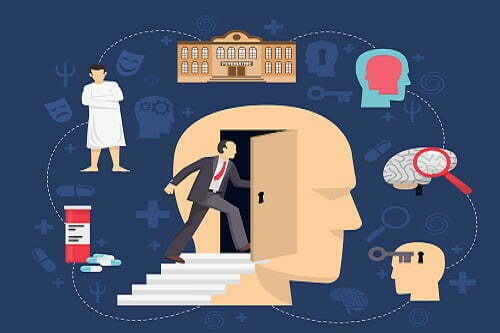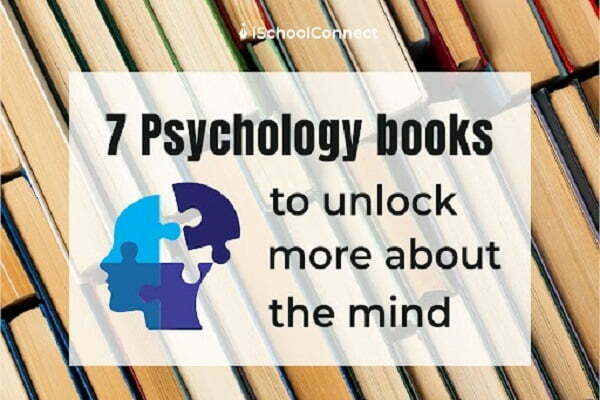Table of Contents
- 1. How to Think Straight About Psychology by Keith Stanovich
- 2. Pioneers of Psychology (3rd Edition) by Raymond Fancher
- 3. The Man Who Mistook His Wife For A Hat: And Other Clinical Tales by Oliver Sacks
- 4. The Psychology Major’s Handbook by Tara L. Kuther
- 5. Career Paths in Psychology: Where Your Degree Can Take You by Robert J. Sternberg
- 6. Getting In: A Step-By-Step Plan for Gaining Admission to Graduate School in Psychology by American Psychological Association
- 7. Cracking the GRE Psychology Subject Test, 8th Edition by The Princeton Review
- Key takeaways
- FAQs
While your psychology classes will have mandatory reading lists, there are some excellent psychology books that you can use to augment your learning of the subject. These books will not only improve your grades but also expand your understanding of psychology. Moreover, psychology books can provide insight into the discipline and its history.
So, we have listed some of the best psychology books for you to read. Keep scrolling!
1. How to Think Straight About Psychology by Keith Stanovich
A renowned book by Keith Stanovich provides a brief introduction to critical thinking techniques. The book offers students a better understanding of the subject matter of psychology. Additionally, it teaches students to distinguish between pseudoscience and genuine psychological research. Also, it allows them to become more sophisticated psychological information consumers.
How to Think Straight About Psychology says about the discipline of psychology what numerous educators might want to say. Stanovich teaches students how to think strategically and critically in this book. Thus, this is an “art of science” book, as well as a guidebook for living an examined life with curiosity and humility about the nature of truth and knowing.
2. Pioneers of Psychology (3rd Edition) by Raymond Fancher
Modern psychology draws on over 3 centuries of exploration and hypothesis; constantly unique and regularly challenging. Professor Fancher follows the growth of this compelling science through the individual victories and disappointments of a captivating exhibition of geniuses like Descartes, Gall, Kant, Piaget, and Skinner in this third edition of ‘Pioneers of Psychology.’ Therefore, this book is Fancher’s interesting account of psychology’s development from its philosophical beginnings to the present day.
Presently, with a completely new section on Artificial Intelligence, Professor Fancher’s book gives a state-of-the-art record of the development in modern psychology. Starting with Pascal’s “Pascaline” and continuing through the machines and projects of Leibniz, Babbage, Turing, Newell, Shaw, and Simon, the part presents the recorded foundations of one of the most significant and questionable issues in modern psychology. Similarly, the new section gives an especially fitting end to the book’s overall recorded overview.

3. The Man Who Mistook His Wife For A Hat: And Other Clinical Tales by Oliver Sacks
This book is a must-read for psychology students and the general public. It’s written by neurologist Oliver Sacks, who works with people who have stranger-than-usual brain issues. The author dives into the clinical experiences of patients suffering from neurological disorders, offering a fascinating and complex perspective on the issue.
Dr. Oliver Sacks retells patients’ narratives attempting to adjust to the frequently unusual universe of neurological disorders. Also, those excused as medically introverted or hindered yet are gifted with uncanny creative or numerical abilities. However, assuming incomprehensibly unusual, these splendid stories enlighten being human. All in all, this book is beneficial to anyone new to psychology.
4. The Psychology Major’s Handbook by Tara L. Kuther
Tara L. Kuther urges kids to take charge of their education and destiny in this book. The first chapter introduces students to psychology and its various subspecialties. It also contains information on the environment in which psychologists work. The following chapters assist students with evaluating their abilities, interests, and talents. It helps them develop habits and practices that will enable them to succeed in psychology subjects.
Drawing on more than 20 years of encounters, questions, thoughts, and energy from working with students, Kuther covers themes applicable to all students paying little heed to their major and fostering a functioning learning style, sharpening concentration on abilities, and turning out to be more mindful. The handbook addresses the particular requirements of psychology students with direction on the most common way of composing terms papers, how to understand articles, and how to compose APA-Style accurate reports.

5. Career Paths in Psychology: Where Your Degree Can Take You by Robert J. Sternberg
Several psychologists who have had considerable success in various fields explain their work in this book. They address questions such as-
- What drew them into it in the first place?
- Do they enjoy it & what do they dislike about it?
- What does a typical work week in their chosen field look like?
These psychologists provide not only guidance and knowledge but also career motivation based on their personal experiences. They talk openly about pay and career prospects, as well as what it takes to succeed in their sector.
Psychologist Robert Sternberg provides a good look at some job alternatives for both students and professionals thinking about changing careers.
6. Getting In: A Step-By-Step Plan for Gaining Admission to Graduate School in Psychology by American Psychological Association
This educational psychology book from the American Psychological Association is a must-have if you’re considering studying psychology at the graduate level. You will get to know the factors admission committees use to evaluate candidates.
This book contains valuable timetables, tips, and apparatuses that break the assignments into sensible advances. Additionally, it assists students with characterizing their objectives, selecting projects, and exploring the application interaction. It includes a monthly plan and incorporates worksheets for choosing the best program. The costs of a graduate degree and financial aid information are mentioned too. It also contains personal essays, letters of reference, and preselection interviews.

7. Cracking the GRE Psychology Subject Test, 8th Edition by The Princeton Review
‘Cracking the GRE Psychology Subject Test’ is an all-encompassing guide. It assists individuals studying for the Graduate Record Examinations.
The following topics are covered in this book-
- Memory
- Thinking
- Feeling
- Perception
- Behavioral neuroscience
- Clinical & pathological psychology
- Lifespan development psychology
- Personality, and social psychology
A sample paper is also included in the book for comprehensive revision and final practice. This book is for students interested in pursuing a degree in psychology at one of America’s top colleges.
Key takeaways
- The psychology books offer you a better knowledge of people’s perspectives, leading to increased empathy rather than detachment.
- Behavioral Psychology books will teach you how to use your brain to modify your behavior or thinking for the better. Control your habits and help you make the best decisions possible.
- It helps you to be more focused, inspired, and productive.
- Guide books on psychology will help you prepare for the admissions programmes. While there are many books avaliable, you can start by reading some of the aforementioned books.
We hope this list will help you get started with your read. If you have any questions/suggestions, you can reach out to us or drop a comment below.
Liked this Blog? Read next: 11 Best UK universities for psychology
FAQs
Q1. What are the benefits of reading psychology books?
Answer- Reading good psychology books allows you to kickstart your education by absorbing what researchers, professors, and authors have spent years compiling. The more you understand human behavior and social psychology, the better.
Q2. Is psychology a worthwhile profession to pursue?
Answer- Psychology is a prosperous and satisfying discipline of study. A variety of criteria determines a psychologist’s compensation, such as educational background, area of expertise, and years of experience in the field.
Q3. What is the best way for me to begin studying psychology?
Answer- To begin a career in psychology, you’ll need a master’s degree (school psychology) or a doctorate (for other specializations). In order to practice psychology, you must first get a bachelor’s degree, pass a state and/or national examination, and meet additional licensing standards.






